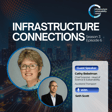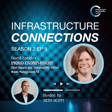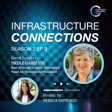
S3E1 - State Capacity and Infrastructure Costs w/ Cailin Slattery
Host Seth Scott interviews Cailin Slattery, Assistant Professor of Economics at the University of California, Berkeley Haas School of Business. Cailin brings us her findings from the paper “State Capacity and Infrastructure Costs” (co-authored with Yale Law School Professor Zachary Liscow and Columbia University's William Nober). Key findings of the report:
👉 One addtional transport employee per 1,000 residents is correlated with 26% lower costs at the project level.
👉 Experience engineers and professionals in the upper 75th percentile are associate dwith 14% rductions in project-level costs.
👉 A single high-quality engineer can save a project up to $750,000 a year
👉 The departure of an experienced engineer can result in cost increases equal to six times their salary. This is equally true if they leave for retirement, the private sector, or an overseas position.
👉 For all these reasons, proponents should be willing to pay up high-quality engineers up to $300,000 per year, well over twice the industry average, to reain that knowledge in house, in the pipeline, and available to the next generation of professionals.
⭐ Links to some of the resources mentioned in the podcast: "State Capacity and Infrastructure Costs": https://papers.ssrn.com/sol3/papers.cfm?abstract_id=4522676
Yale Tobin Center for Economic Policy: "Experienced state employees can deliver big savings on infrastructure": https://tobin.yale.edu/research/experienced-state-employees-can-deliver-big-savings-infrastructure
👉 We'd love to hear your feedback, share your thoughts on the comment section below.
👉 Like & Subscribe so you won't miss out on our upcoming episodes!
👉 Keep up to date with the Infrastructure Sustainability Council:
Website: https://www.iscouncil.org/
LinkedIn: / infrastructure-sustainability-council
#podcast #infrastructure #sustainability #buildingtomorrow

















